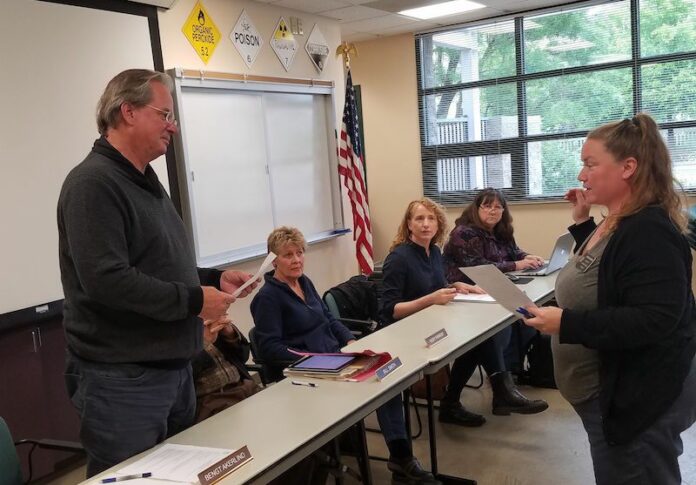
Cannabis communication was the main talking point at the last Dry Creek Valley Citizens Advisory Council (DCVCAC) on May 16.
The need for better communication was addressed after the council’s last meeting in February resulted in a large public outcry from the neighbors of one proposed cannabis operation on Palmer Creek.
The DCVCAC had recommended Thomas Planson’s project for approval as it saw the project as not having any contention. There were, however, several neighbors who disapproved of the project and were known by the county, which DCVCAC reports to.
The county did not give the neighbors’ view to the DCVCAC prior to the recommendation and the neighbors were not contacted by the county in regard to the meeting.
At the May 16 meeting, many of those neighbors attended and expressed their concerns that the council does not properly represent them. They saw the cannabis industry as something that is much different than the normal wine permit process and noted that without time to protest cannabis projects this early on, they can become hard to stop.
“There is a bigger issue,” councilmember Vicki Farrow said, noting the breakdown between the county and their council.
Councilmember Bill Smith read an excerpt of a memo sent to them by the county, citing a “bureaucratic bungling” on the county’s part relaying concerned neighbor information.
“We were told it was a complete project,” Smith said.
President Jennifer Gomez added that even as communication is smoothed out, the cannabis application process is new for everyone. For example, she said that the odor of a project is new and needs specific expertise. She said by going over more and more applications, the council could build up its expertise, and cited a checklist that the council has refined in regard to the more familiar winery and vineyard application process.
“We’re your neighbors, too,” Gomez said, adding that it was never the council’s intention to ignore concerns.
She also said that the goal was to come up with a working solution. She wanted to see the cannabis industry “move into the light” and noted that it will be a slow process even with all sides at the table.
Possible options for better communication moving forward suggested at the meeting were possible legal noticing in the newspaper and ensuring all information is provided in a timely manner. An update to the scope and changes to cannabis policy was put forward as a future agenda item.
There was some more informal discussion between concerned Palmer Creek residents and the council, which resulted in a greater understanding of that particular instance’s breakdown.
However, in a statement emailed to the DCVCAC after the meeting, Judith Olney, president of the Westside Community Association (WCA), wrote that, “As we respect Dry Creek’s decision to operate under a CAC (citizen advisory council), the Westside and Palmer Creek areas trust that you respect our decision to follow a different path forward — a Westside Advisory Forum.”
In the proposal, “The WCA board recommends the county convene a Permit Sonoma staff-led ‘Westside Advisory Forum’ to obtain stakeholder input. Facilitation by professional staff will ensure applicant and neighbor dialog (resident or business) in a forum designed to obtain multiple perspectives, correct misinformation and consider all land owner rights and environmental measures.”
This way, the proposal states that there will be less intermediary bureaucracy.
The DCVCAC briefly addressed whether there was any interest in its boundaries being changed due to the formation of a new agency. There was none. The DCVCAC does not have the authority to set its own boundaries, so no further discussion was held.
There were two additional projects originally on the agenda. One was a lot line adjustment for Wayne and Pauline Rodgers, but was taken off the agenda. The other, for Steven Sommer’s cannabis project, is still having community discussion, as the project was directed to at the DCVCAC meeting in February.
The council also swore in a new member, Benkt Akerland. Councilmember Ruth Wilson was absent.
The DCVCAC typically meets once a month. To sign up for its mailing list, email Secretary Sharon Pillsbury at [email protected].
EDITOR’S NOTE: This article has been corrected to show the Rodgers’ lot line adjustment was removed. The Rodgers do not have a cannabis project.




